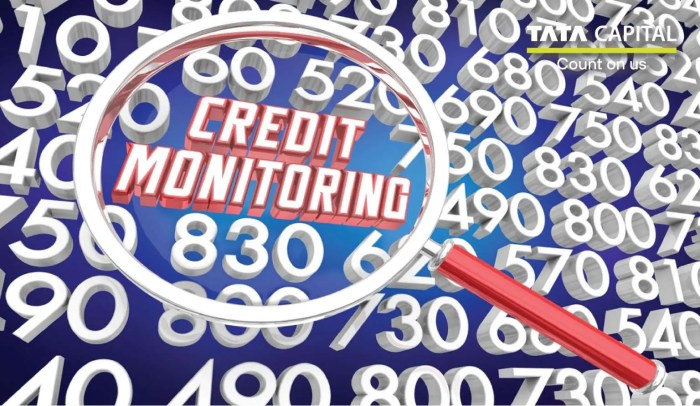Diving into the realm of financial well-being, the significance of credit monitoring shines brightly as a beacon of protection and awareness. Delving deeper, we uncover how this practice not only safeguards against identity theft but also plays a pivotal role in shaping our credit scores and financial decisions.
Importance of Credit Monitoring

Credit monitoring is crucial for maintaining financial health as it allows individuals to keep track of their credit reports, detect any errors or fraudulent activities, and ultimately protect their credit scores. By regularly monitoring their credit, individuals can catch any suspicious activity early on and take necessary steps to mitigate potential damage.
Early Detection of Identity Theft
- Monitoring your credit can help you spot any unauthorized transactions or accounts opened in your name, indicating potential identity theft.
- By reviewing your credit report regularly, you can identify any discrepancies and take immediate action to resolve them, preventing further harm to your credit history.
Impact on Credit Scores and Financial Decisions
- Through credit monitoring, individuals can maintain a good credit score by ensuring that all information on their credit report is accurate and up-to-date.
- By monitoring changes in their credit score, individuals can also make informed financial decisions, such as applying for loans or credit cards, based on their current credit standing.
Benefits of Regular Credit Monitoring
Regularly monitoring your credit reports comes with a variety of benefits that can help you stay financially secure and responsible. By keeping a close eye on your credit, you can catch errors or discrepancies early, which can ultimately save you from potential financial headaches down the road.
Early Error Detection
- Regular credit monitoring allows you to catch any mistakes or inaccuracies on your credit report early on.
- By identifying errors promptly, you can take the necessary steps to dispute them and prevent any negative impact on your credit score.
- Errors on your credit report can include incorrect personal information, fraudulent accounts, or inaccurate payment history, all of which can harm your creditworthiness.
Improved Financial Awareness
- Monitoring your credit regularly can help you become more aware of your financial habits and behaviors.
- By tracking your credit score and report, you can see how your financial decisions impact your creditworthiness over time.
- This increased awareness can lead to better financial decision-making and a more responsible approach to managing your finances.
Tools and Services for Credit Monitoring
Credit monitoring tools and services play a crucial role in helping individuals keep track of their credit health. With the increasing number of options available in the market, it’s essential to understand the common tools and services offered, compare their features and costs, and learn how to effectively utilize them for monitoring credit.
Credit Monitoring Services Comparison
- Free Credit Monitoring Services: Some financial institutions and credit card companies offer free credit monitoring services to their customers. While these services may provide basic alerts for changes in credit reports, they may not offer comprehensive monitoring.
- Paid Credit Monitoring Services: Paid services, such as IdentityForce, LifeLock, and Experian, offer more advanced features like daily credit monitoring, identity theft protection, and credit score tracking. These services usually come with a monthly or annual fee.
- Credit Monitoring Tools: Tools like Credit Karma and Credit Sesame provide free credit monitoring services along with credit score simulators, credit report analysis, and personalized recommendations for improving credit health.
Utilizing Credit Monitoring Tools Effectively
- Sign up for alerts: Set up alerts for any changes in your credit report, such as new accounts opened or late payments reported.
- Monitor your credit score: Regularly check your credit score to track changes and identify any potential issues that may impact your credit health.
- Review credit reports: Take advantage of tools that offer access to your credit reports to review them for inaccuracies or suspicious activity.
- Act on alerts: If you receive an alert about a potentially fraudulent activity, take immediate steps to investigate and resolve the issue to protect your credit.
Establishing Healthy Credit Monitoring Habits
Establishing healthy credit monitoring habits is crucial for maintaining financial well-being and ensuring a strong credit score. By following these tips, individuals can effectively monitor their credit and make informed decisions regarding their finances.
Check Credit Reports Regularly
- Set a schedule to check your credit reports at least once a month to stay on top of any changes or suspicious activity.
- Utilize free credit monitoring services offered by many financial institutions and credit bureaus to receive alerts about any significant changes to your credit report.
Understanding Credit Report Information
- Take the time to review each section of your credit report, including personal information, account history, and inquiries, to ensure accuracy and identify any errors.
- Pay attention to your credit utilization ratio, payment history, and credit inquiries, as these factors greatly impact your credit score.
Monitoring Credit Score Changes
- Track changes in your credit score over time to gauge the impact of your financial decisions and identify areas for improvement.
- Use online tools and resources to simulate how certain actions, such as paying off debt or opening a new credit account, could affect your credit score.